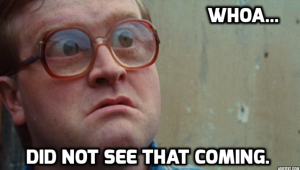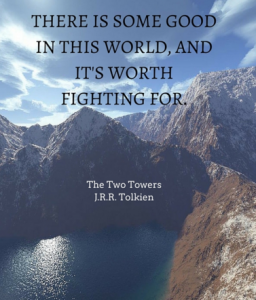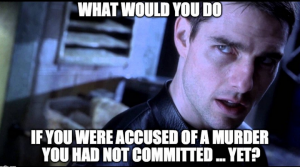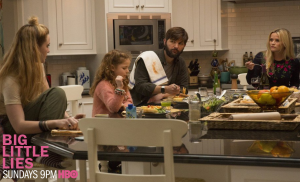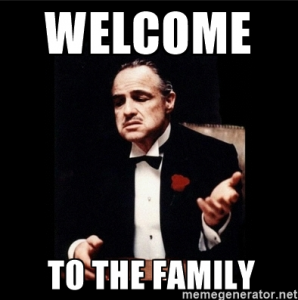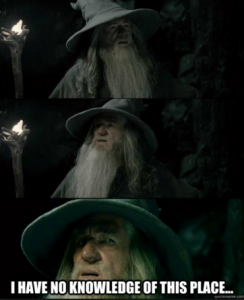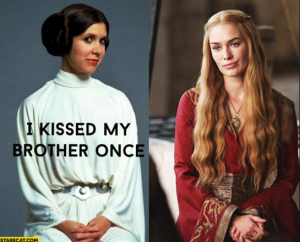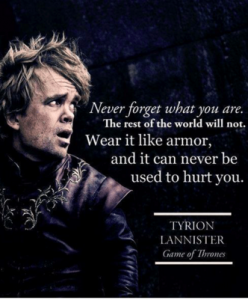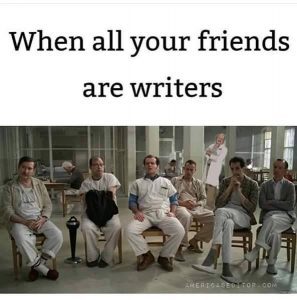Kristen Lamb's Blog, page 33
March 10, 2017
The X Factor—How Character Determines Plot
Last time we talked about paradigms, and how paradigms are what make the difference between a flat one-dimensional character background and a fully dimensional creation. The paradigm is the meaning of the background, the character’s interpretation of their own experiences.
The context.
We all know there is an inherent X factor to humans. Theologians, scientists, geneticists, sociologists, psychiatrists and self-help gurus have all been trying to unravel that X factor probably since humans had enough free time to get existential. The nature-nurture argument is still alive and well with no clear answers.
The paradigm represents this X factor.
One person gets mugged and becomes agoraphobic. Another becomes a black belt. And yet another brushes it off and is just more careful and maybe carries pepper spray. Humans are all vastly different, and this provides the wide pallet of color from which the skilled writer can then create.
In the last post, we referred to the paradigm as a set of lenses. Experience, birth order, genetics, etc. all serve to grind the lenses the character wears. As also mentioned in the last post, the protagonist wears these lenses but only we—Author God—know these lenses are flawed and in need of replacing.
The protagonist believes he is seeing clearly. The plot problem is what eventually shows how wrong the protagonist is.
Now when we simply look at the protagonist—because it is HER story—we know the core plot problem we create must be directly related to shattering HER particular paradigm. If the plot doesn’t do this? It’s going to fizzle, because there simply won’t be any conflict. The paradigm reveals the pain point, the critical node and perfect place for us to strike.
If the character is family-centered, we go after the family. Job-centered? Go for the job. Relationship-centered? A break-up is on the horizon.
Y’all get the gist.
We need to smash what the protagonist believes is important and reveal what really is important. Let’s look at a couple of examples to see how this works. I’m going to use different genres so you guys get a better feel for what I am talking about.
The Lord of the Rings Trilogy
Frodo is achievement-centered. He believes The Shire is holding him back. It is too prosaic, too mundane. No, he is called to adventure and wants to see the world and experience dragons and orcs and look for treasure. He has a romanticized notion that what is outside The Shire is far more important than The Shire.
This means we need to give him a plot problem that 1) gets him out of The Shire (give him what he believes he wants) 2) exposes that all this adventure he has been dreaming about is seriously NOT as wonderful as he’d imagined 3) place The Shire and all he took for granted in genuine danger of being lost for good.
In the beginning of our tale, Frodo cannot wait to leave The Shire. In the middle (Book Two) all he wants to do is return to The Shire and by the end (Book Three) he is willing to die to save the very place he took for granted. His lenses of All Outside the Shire is Super Awesome have been shattered and replaced.
The Minority Report
John Anderton not only heads Pre-Crime, he is a bonafide acolyte of a system that uses the Pre-Cogs to see a crime before it ever happens. With Pre-Crime the murder rate in D.C. has dropped to almost zero, and with less-than-subtle encouragement from his mentor? John firmly believes that Pre-Crime is the answer to human sin, that if it had only been around a few years earlier, he would never have lost his son.
John drinks the Pre-Crime Kool-Aid.
He honestly believes there really is no such thing as free will, that humans don’t have the ability to choose. That what the Pre-Cogs see is set. He is all about the job, because his job is changing the world and making it “safe.”
John is job-centered. His entire identity is wrapped up in Pre-Crime.
So, knowing this, the screenwriters (tasked with adapting the Philip K. Dick version for film) understood precisely where to strike. They knew to hit John Anderton right in the job, right in his belief in the infallibility of Pre-Crime. How did they do this?
They red-balled him (a red-ball is a warning of premeditated murder).
John believes that the Pre-Cogs are infallible. But how is he supposed to murder a man he has never even met? By the end of our tale, the man who believed enough in Pre-Crime to lead the charge to take it national, is now the one who destroys it. By the end he can finally see the wreckage of his life.
Before, when he had the job-centered lenses, he was driven by the career, fueled by drugs and haunted by his guilt. In all of this he’d pushed away his wife, destroyed his marriage and haloed countless potentially innocent people who very well might have made a different decision in the seconds before…just as he had.
With new lenses, he can finally SEE his flawed world and set it right. Tear down Pre-Crime, free those jailed under it, let go and mourn his son, and reunite with his estranged wife.
Big, Little Lies
I touched on Liane Moriatry’s Big, Little Lies last time. The story actually blends the threads of three major characters but for the sake of brevity? We will continue to pick on Madeline. As I mentioned last time, Madeline has a family-centered paradigm. Her entire worth and how she sees herself and her world is caught up in her ability to be a mother.
More accurately, how much her daughters need her.
In the beginning of the story we get that Madeline is losing her grip. Her youngest daughter Chloe is finally in grade school and is becoming more and more independent. To make matters worse, Madeline’s ex-husband, Nathan, who abandoned her and the older daughter Abigail years before is back with a new (and far younger) wife, Bonnie. He also has a new daughter Skye, who’s enrolled in the same school (and same class) as Chloe.
Madeline already feels her identity grip slipping in the beginning, so what did Moriarty do? She stomped on Madeline’s fingers and dropped her off the ledge. If her entire being rests on her children needing her, what will she do when Abigail bonds with her “replacement” Bonnie? When her daughter decides to leave the mother who stood by her for the man who abandoned them both?
The story problem forces Madeline to learn the old adage, If you love something, let it go and trust that her daughter will return. Trust is not Madeline’s strong suit for obvious reasons (namely abandonment). But Madeline is going to have to learn to forgive and to trust in order to be reunited with her older daughter.
She needs to lose the family-centered glasses and realize she is a person in her own right and that her identity cannot rest on her children’s need because that has led to control and not love.
I am hoping you are seeing the depth that the paradigm offers as well as how it is almost a witching stick for finding the perfect story for your character. By adding the paradigm, plot almost magically reveals itself. Next time we are going to take the idea of paradigms even further to show how this is going to generate page-turning conflict throughout and keep your readers up so late they will curse your name but secretly love you for all that missed sleep.
What are your thoughts? Can you use this idea of paradigms to see your favorite books and movies in a whole new light?
I LOVE hearing from you!
****The site is new, and I am sorry you have to enter your information all over again to comment, but that is a ONE TIME deal. After you do it once, WP will recognize you as a regular *sings Cheers theme song* once I approve the comment.
Also know I love suggestions! After almost 1,100 blog posts? I dig inspiration. So what would you like me to blog about?
Talk to me!
And to prove it and show my love, for the month of MARCH, everyone who leaves a comment I will put your name in a hat. If you comment and link back to my blog on your blog, you get your name in the hat twice. What do you win? The unvarnished truth from yours truly.
I will pick a winner once a month and it will be a critique of the first 20 pages of your novel, or your query letter, or your synopsis (5 pages or less).
February’s winner of the 20 page critique is Dominic Scezki. Congratulations! Please send your 5000 word WORD document (12 point, Times New Roman, one-inch borders, double-spaced) to kristen at wana intl.com.
SIGN UP NOW FOR UPCOMING CLASSES!!!
Remember that ALL CLASSES come with a FREE RECORDING so you can listen over and over. So even if you can’t make it in person? No excuses! All you need is an internet connection!
NEW CLASS!!!! Hollywood Producer Joel Eisenberg’s Master’s Series: HOW TO MAXIMIZE YOUR EARNING POTENTIAL AS A FULL-TIME AUTHOR (Includes all classes listed below) Normally $400 but at W.A.N.A. ONLY $199 to learn from Joel IN YOUR HOME.
OR, if it works better, purchase Joel’s classes individually…
Potentially Lucrative Multi-Media Rights $65 February 21st, 2107 (AVAILABLE ON DEMAND)
How to Sell to Your Niche Market $65 February 28th, 2017
It’s Not Who You Know, It’s Who Knows YOU $65 March 7th, 2017
Making Money Speaking, Teaching, Blogging and Retaining Rights $65 March 14th, 2017
Individual Classes with MOI!
Blogging for Authors $50 March 30th, 2017
Pitch Perfect—How to Write a Query Letter and Synopsis that SELLS! $45 March 20th, 2017
Hooking the Reader—Your First Five Pages $40 March 18th, 2017
For those who need help building a platform and keeping it SIMPLE, pick up a copy of my latest social media/branding book Rise of the Machines—Human Authors in a Digital World on
March 8, 2017
Creating Characters—The 7 Habits of Seriously Messed Up People
What really makes a great story? I read an insane amount and always have, but it really wasn’t until I decided to go pro that I began looking at books very differently. Why were some books so utterly forgettable and others? I couldn’t get out of my head. What made the difference?
Why do I still revisit The Hours, The English Patient, Big, Little Lies, A Girl on the Trail, Gone Girl, The Luckiest Girl Alive? And others? I can’t recall if I even read them. I look at my Kindle menu and it claims I read it but…
This said, I’ve been putting a lot of thought lately into character. Reverse engineering it so that I can better understand what makes it tick. I’ve mentioned the raging debate about character-driven stories versus plot-driven stories and really all great stories are both.
Story is a machine. An engine. And if story is a machine, then plot and character are cogs. If one is flawed or weak or breaks? It cannot help but impact the overall machine.
But today, we are going to focus on the character cog. How do we create characters with resonance?
Who Are You?
Now, I know a lot of writing books recommend doing character sheets. There is nothing wrong with that. Get it out. Free write on the page. Think about who the character is, where she came from. Social class, religion, economic status, childhood, etc. Tell his or her life story and get it down.
But now I want you to dig a little deeper—ok, a LOT deeper—and ask…
What is my character’s paradigm?
This is to say, what is her reality? Her framework? What defines her? And, most importantly, what is its center? How does the character define his or her worth? Because a background sheet is nothing more than facts without context. To create a dimensional character, context is king.
Paradigms offer that context.
Though sociologists and self-help experts have used the notion of paradigms to assist personal growth, as a writer I felt the need to use this idea for a far darker purpose. Instead of using the paradigm to fix messed up people, I use it to create them.
So I bring you…
The Seven Habits of Seriously Messed Up People
Great fiction is about problems. It is about people with problems. And the more messed up they are? The better.
This means that to write any great story, we are going to need to create some seriously jacked up people.
So to do this, we need to know the character’s paradigm. But before we go further, I want to explain a bit how a paradigm works. Stephen Covey explains the paradigm as a set of lenses through which we see ourselves and our world. Rolling with that metaphor, a quick story to help you relate this to creating memorable fiction.
When I was pregnant with Spawn I suddenly needed glasses after having perfect vision my whole life. So I get glasses and can see! Yay! I just assumed I was getting older and accepted I now wore glasses.
But then something strange happened.
When Spawn was about three I kept getting headaches. My eyes hurt. I couldn’t see detail. Naturally I assumed I needed a stronger prescription so I went to the eye doctor. Turned out? I no longer needed the glasses. My vision had returned to 20/20.
So why did I feel the need to share?
When creating the character, take all of that background information then go deeper and reflect on what lenses the character is using. Our protagonist in the beginning wears a set of lenses that he or she is unaware no longer work. Maybe they did in the beginning, but life has changed. Maybe they never worked at all but the character has no basis for comparison so is unaware.
Regardless, they (our characters) believe their vision is correct, but we as Author God know that it isn’t. Our characters are suffering the headaches, strain and fatigue but are not necessarily aware what is causing such discomfort.
Plot is what will reveal that the old lenses are flawed and trade them for newer, corrected lenses that finally offer the clear picture and alleviate the strain.
Let Me Demonstrate
For instance, in Liane Moriarty’s Big Little Lies the character Madeline has a family-centered paradigm. Her worth is determined by her effectiveness as a mother and being needed by her children.
In Jessica Knoll’s Luckiest Girl Alive, Tif-Ani has a status-centered paradigm and believes social position and wealth are the most important things in life, that they are what will make her happy. Her dream job and marrying old money define who she is.
In Michael Connelly’s The Lincoln Lawyer, Mickey Haller has an achievement-centered paradigm. Winning is paramount because winners get paid. He does not see himself as a justice-seeker, which is why he only defends those he is sure are guilty.
When we pan back and look at these great stories with the idea of paradigms in mind, then the genius of plot becomes far more obvious. We have the characters, we know them and now we have the perfect way to make them scream. We are going to show them that what they believe to be true really isn’t, that what they see is inherently flawed. That is what all three of these authors did in these three remarkable stories.
Madeline gets tossed through the parenting wringer, Tif-Ani is forced to confront the demons of her past that are driving her future, and Mickey Haller is confronted with the client he always feared. And to me, THIS is what elevates stories like these from mundane to magnificent.
All great characters have their paradigm challenged then shattered then reformed. Paradigm melds character and plot into one. Plot problems are more than just “bad stuff happening” and instead, are direct challenges to the ego. Without paradigm, characters are one-dimensional puppets passively reacting to ill fortune.
Paradigm=Character
Paradigm is what adds depth to that backstory because backstory alone is not enough. We need to get to the interpretation of the backstory.
Game of Thrones. Every single one of the Lannister children is remarkably different even though they are from the same family…because of paradigms.
But even if we simply wrote ONE character background, we could have the same background and create countless variations off of it. How? Paradigm.
One woman grows up in a big domineering over-involved family and can’t wait to run away and do her own thing. She has no interest in marriage or children and wants a career.
Another? Has no idea why you wouldn’t want to live across the street from all ten of your relatives. She can’t imagine a world where family wasn’t meddling in everything. She can’t wait to get married and have lots of babies.
Same back story. Different interpretation. You, Author God, get to choose 
March 6, 2017
Mistakes Were Made & The HIGH Cost of Free
As digital age authors we have challenges and responsibilities unique to the time we are in. Namely, our job has become vastly more complex. This is why it is really important to get the right information from the get-go. If y’all hadn’t noticed, this blog is now on my author web site. FINALLY!
So happy y’all are here!
The site is a work in progress and will continue to evolve, but I want my journey to be a lesson because I love you and I want you all to be super successful.
It Started Out Harmless Enough
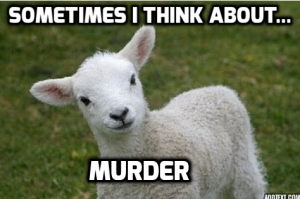 I am a Generation Xer through and through, in life and in regards to my profession. I didn’t “come of age” as a writer in the digital world. I decided to become an author in a world with typewriters and snail mail, where we went to libraries to research and the only way to connect with an agent was to drop several hundred bucks to go to a conference.
I am a Generation Xer through and through, in life and in regards to my profession. I didn’t “come of age” as a writer in the digital world. I decided to become an author in a world with typewriters and snail mail, where we went to libraries to research and the only way to connect with an agent was to drop several hundred bucks to go to a conference.
I had to struggle to find my way in a world I’d only believed was possible in science fiction, which was super fun namely because NO ONE knew what the hell they were doing. Back in 2006 we really had no good way of discerning solid advice from sheer BS.
Many of y’all know my story. I did NOT set out to become a social media guru. In fact the word guru makes me itch. It just kind of happened because I am a know-it-all and a meddler. I joke that my first social media book should have been called, I Did All the Dumb Sh%$ So You Don’t Have To.
I bitched so much about people doing it wrong (or teaching it wrong) that I finally just wrote my own book 
February 27, 2017
The Seven Deadly Sins of Prologues—What Doesn't Work and What Does

We writers have a vast array of tools at our disposal to craft stories readers will love. But like any tool, it helps if we know how to use it properly. Theme is wonderful. It can keep us plunging a story’s depths for years when used correctly. Applied incorrectly? It just makes a story annoying and preachy.
Description! Love me some description! But pile on too much and we can render a story unreadable.
The same can be said of prologues. Now, before we get into this, I want to make it clear that certain genres lend themselves to prologues. But even then, we are wise to make sure the prologue is serving the story.
So, to prologue or not to prologue? That is the question.
The problem with the prologue is it has kind of gotten a bad rap over the years, especially with agents. They generally hate them. Why? In my opinion, it is because far too many writers don’t use prologues properly and that, in itself, has created its own problem.
Because of the steady misuse of prologues, many readers skip them. Thus, the question of whether or not the prologue is even considered the beginning of your novel can become a gray area if the reader just thumbs pages until she sees Chapter One.
So without further ado…
The 7 Deadly Sins of Prologues
 Evil Odin.
Evil Odin.Sin #1 If your prologue is really just a vehicle for massive information dump…
This is one of the reasons I recommend writing detailed backgrounds of all main characters before we begin (especially when we are new writers). Get all of that precious backstory out of your system.
This is a useful tactic in that first, it can help us see if a) our characters are psychologically consistent, b) can provide us with a feel for the characters’ psychological motivations, which will help later in plotting.
I have a little formula: background–> motivations –>goals–>a plan–>a detailed plan, which = plot and c) can help us as writers honestly see what details are salient to the plot.
This helps us better fold the key details into the plotting process so that this vital information can be blended expertly into the story real-time.
Many new writers bungle the prologue because they lack a system that allows them to discern key details or keep track of key background details. This makes for clumsy writing, namely a giant “fish head” labeled prologue (which we editors will just lop off).
Sin #2 If your prologue really has nothing to do with the main story.
This point ties into the earlier sin. Do this. Cut off the prologue. Now ask, “Has this integrally affected the story?” If it hasn’t? It’s likely a fish head masquerading as a prologue.
Sin #3 If your prologue’s sole purpose is to “hook” the reader…
If readers have a bad tendency to skip past prologues, and the only point of our prologue is to hook the reader, then we have just effectively shot ourselves in the foot. We must have a great hook in a prologue, but then we need to also have a hook in Chapter One. If we can merely move the prologue to Chapter One and it not upset the flow of the story? Then that is a lot of pressure off our shoulders to be “doubly” interesting.
Sin #4 If your prologue is overly long…
Prologues need to be short and sweet and to the point. Get too long and that is a warning flag that this prologue is being used to cover for sloppy writing or really should have just been Chapter One.
Sin #5 If your prologue is written in a totally different style and voice that is never tied back into the main story…
Pretty self-explanatory.
Sin #6 If your prologue is über-condensed world-building…
World-building is generally one of those things, like backstory, that can and should be folded into the narrative. Sometimes it might be necessary to do a little world-building, but think “floating words in Star Wars.” The yellow floating words that drift off into space help the reader get grounded in the larger picture before the story begins. But note the floating words are not super-detailed Tolkien world-building.
They are simple and, above all, brief.
Sin #7 If your prologue is there solely to “set the mood…”
We have to set the mood in Chapter One anyway, so like the hook, why do it twice?
The Prologue Virtues
 Still Evil Odin but with “Cute Face.”
Still Evil Odin but with “Cute Face.”Now that we have discussed the 7 Deadly Sins of Prologues, you might be asking yourself, “So when is it okay to use a prologue?” Glad you asked.
Virtue #1 Prologues can be used to resolve a time gap with information critical to the story.
Genre will have a lot to do with whether one uses a prologue or not. Thrillers generally employ prologues because what our hero is up against may be an old enemy. In James Rollins’s The Doomsday Key the prologue introduces the “adversary” Sigma will face in the book. Two monks come upon a village where every person has literally starved to death when there is more than an abundance of food.
Many centuries pass and the very thing that laid waste to that small village is now once more a threat. But this gives the reader a feel for the fact that this is an old adversary. The prologue also paints a gripping picture of what this “adversary” can do if unleashed once more.
The prologue allows the reader to pass centuries of time without getting a brain cramp. Prologue is set in medieval times. Chapter One is in modern times. Prologue is also pivotal for understanding all that is to follow.
Prologues are used a lot in thrillers and mysteries to see the crime or event that sets off the story. Readers of these genres have been trained to read prologues and generally won’t skip. The serial killer dumping his latest victim is important to the story. It’s a genre thing. Yet, still? Keep it brief. Reveal too much and readers won’t want to turn pages to learn more.
Virtue # 2 Prologues can be used if there is a critical element in the backstory relevant to the plot.
The first Harry Potter book is a good example of a book that could have used a prologue, but didn’t (likely because Rowling knew it would likely get skipped). Therese Walsh in her blog Once Before A Time Part 2 said this:
J.K. Rowling’s Harry Potter and the Sorcerer’s Stone is told in a close 3rd person POV (Harry’s), but her first chapter is quite different, told when Harry is a baby and switching between omniscient and 3rd person POVs (Mr. Dursley’s and Dumbledore’s). Rowling may have considered setting this information aside as a prologue because of those different voices and the ten-year lag between it and the next scene, but she didn’t do it. The info contained in those first pages is critical, it helps to set the story up and makes it more easily digested for readers. And it’s 17 pages long.
This battle is vital for the reader to be able to understand the following events and thus would have been an excellent example of a good prologue. But, Rowling, despite the fact this chapter would have made a prime prologue still chose to make it Chapter One so the reader would actually read this essential piece of story information.
Food for thought for sure.
Yes, I had Seven Sins and only Two Virtues. So sue me  . That should be a huge hint that there are a lot more reasons to NOT use a prologue than there are to employ one (that and I didn’t want this blog to be 10,000 words long).
. That should be a huge hint that there are a lot more reasons to NOT use a prologue than there are to employ one (that and I didn’t want this blog to be 10,000 words long).
Prologues, when done properly can be amazing literary devices. Yet, with a clear reader propensity to skip them, then that might at least make us pause before we decide our novel must have one. Make sure you ask yourself honest questions about what purpose these pages are really serving. Are they an essential component of a larger whole? Or are you using Bondo to patch together a weak plot?
But, don’t take my word for it. Over the ages, I’ve collected great blogs regarding prologues to help you guys become stronger in your craft. These are older posts, but timeless:
Once Before a Time: Prologues Part 1 by Therese Walsh
Once Before a Time Part 2 by Therese Walsh
Agent Nathan Bransford offers his opinion as does literary agent Kristin Nelson
Carol Benedict’s blog Story Elements: Using a Prologue
To Prologue or Not To Prologue by Holly Jennings
If after all of this information, you decide you must have a prologue because all the coolest kids have one, then at least do it properly. Here is a great e-how article.
So if you must write a prologue, then write one that will blow a reader away. Take my First Five Pages class (below) and I can give you some expert perspective of whether to keep or ditch or if you want to keep your prologue, then how can you make it WORK?
What are some of the questions, concerns, troubles you guys have had with prologues? Which ones worked? Which ones bombed? What are your solutions or suggestions?
What are your thoughts?
I LOVE hearing from you! And REMEMBER TO SIGN UP TO HANG OUT AND LEARN FROM HOLLYWOOD PRODUCER JOEL EISENBERG! Details are below. This is EIGHT hours with one of the hottest producers in Hollywood teaching everything from craft to how to SELL what we write! Recordings are included with your purchase for FREE!
And to prove it and show my love, for the month of FEBRUARY, everyone who leaves a comment I will put your name in a hat. If you comment and link back to my blog on your blog, you get your name in the hat twice. What do you win? The unvarnished truth from yours truly.
I will pick a winner once a month and it will be a critique of the first 20 pages of your novel, or your query letter, or your synopsis (5 pages or less).
SIGN UP NOW FOR UPCOMING CLASSES!!!
Remember that ALL CLASSES come with a FREE RECORDING so you can listen over and over. So even if you can’t make it in person? No excuses! All you need is an internet connection!
NEW CLASS!!!! Hollywood Producer Joel Eisenberg’s Master’s Series: HOW TO MAXIMIZE YOUR EARNING POTENTIAL AS A FULL-TIME AUTHOR (Includes all classes listed below) Normally $400 but at W.A.N.A. ONLY $199 to learn from Joel IN YOUR HOME.
OR, if it works better, purchase Joel’s classes individually…
Potentially Lucrative Multi-Media Rights $65 February 21st, 2107 (AVAILABLE ON DEMAND)
How to Sell to Your Niche Market $65 February 28th, 2017
It’s Not Who You Know, It’s Who Knows YOU $65 March 7th, 2017
Making Money Speaking, Teaching, Blogging and Retaining Rights $65 March 14th, 2017
Individual Classes with MOI!
Blogging for Authors $50 March 30th, 2017
Plotting for Dummies $35 February 17th, 2017
Pitch Perfect—How to Write a Query Letter and Synopsis that SELLS! $45 March 20th, 2017
NEW CLASS!!!! The Art of Character $35 February 24th, 2017
Hooking the Reader—Your First Five Pages $40 March 18th, 2017
For those who need help building a platform and keeping it SIMPLE, pick up a copy of my latest social media/branding book Rise of the Machines—Human Authors in a Digital World on
The Seven Deadly Sins of Prologues—What Doesn’t Work and What Does
[image error]
We writers have a vast array of tools at our disposal to craft stories readers will love. But like any tool, it helps if we know how to use it properly. Theme is wonderful. It can keep us plunging a story’s depths for years when used correctly. Applied incorrectly? It just makes a story annoying and preachy.
Description! Love me some description! But pile on too much and we can render a story unreadable.
The same can be said of prologues. Now, before we get into this, I want to make it clear that certain genres lend themselves to prologues. But even then, we are wise to make sure the prologue is serving the story.
So, to prologue or not to prologue? That is the question.
The problem with the prologue is it has kind of gotten a bad rap over the years, especially with agents. They generally hate them. Why? In my opinion, it is because far too many writers don’t use prologues properly and that, in itself, has created its own problem.
Because of the steady misuse of prologues, many readers skip them. Thus, the question of whether or not the prologue is even considered the beginning of your novel can become a gray area if the reader just thumbs pages until she sees Chapter One.
So without further ado…
The 7 Deadly Sins of Prologues
[image error]
Evil Odin.
Sin #1 If your prologue is really just a vehicle for massive information dump…
This is one of the reasons I recommend writing detailed backgrounds of all main characters before we begin (especially when we are new writers). Get all of that precious backstory out of your system.
This is a useful tactic in that first, it can help us see if a) our characters are psychologically consistent, b) can provide us with a feel for the characters’ psychological motivations, which will help later in plotting.
I have a little formula: background–> motivations –>goals–>a plan–>a detailed plan, which = plot and c) can help us as writers honestly see what details are salient to the plot.
This helps us better fold the key details into the plotting process so that this vital information can be blended expertly into the story real-time.
Many new writers bungle the prologue because they lack a system that allows them to discern key details or keep track of key background details. This makes for clumsy writing, namely a giant “fish head” labeled prologue (which we editors will just lop off).
Sin #2 If your prologue really has nothing to do with the main story.
This point ties into the earlier sin. Do this. Cut off the prologue. Now ask, “Has this integrally affected the story?” If it hasn’t? It’s likely a fish head masquerading as a prologue.
Sin #3 If your prologue’s sole purpose is to “hook” the reader…
If readers have a bad tendency to skip past prologues, and the only point of our prologue is to hook the reader, then we have just effectively shot ourselves in the foot. We must have a great hook in a prologue, but then we need to also have a hook in Chapter One. If we can merely move the prologue to Chapter One and it not upset the flow of the story? Then that is a lot of pressure off our shoulders to be “doubly” interesting.
Sin #4 If your prologue is overly long…
Prologues need to be short and sweet and to the point. Get too long and that is a warning flag that this prologue is being used to cover for sloppy writing or really should have just been Chapter One.
Sin #5 If your prologue is written in a totally different style and voice that is never tied back into the main story…
Pretty self-explanatory.
Sin #6 If your prologue is über-condensed world-building…
World-building is generally one of those things, like backstory, that can and should be folded into the narrative. Sometimes it might be necessary to do a little world-building, but think “floating words in Star Wars.” The yellow floating words that drift off into space help the reader get grounded in the larger picture before the story begins. But note the floating words are not super-detailed Tolkien world-building.
They are simple and, above all, brief.
Sin #7 If your prologue is there solely to “set the mood…”
We have to set the mood in Chapter One anyway, so like the hook, why do it twice?
The Prologue Virtues
[image error]
Still Evil Odin but with “Cute Face.”
Now that we have discussed the 7 Deadly Sins of Prologues, you might be asking yourself, “So when is it okay to use a prologue?” Glad you asked.
Virtue #1 Prologues can be used to resolve a time gap with information critical to the story.
Genre will have a lot to do with whether one uses a prologue or not. Thrillers generally employ prologues because what our hero is up against may be an old enemy. In James Rollins’s The Doomsday Key the prologue introduces the “adversary” Sigma will face in the book. Two monks come upon a village where every person has literally starved to death when there is more than an abundance of food.
Many centuries pass and the very thing that laid waste to that small village is now once more a threat. But this gives the reader a feel for the fact that this is an old adversary. The prologue also paints a gripping picture of what this “adversary” can do if unleashed once more.
The prologue allows the reader to pass centuries of time without getting a brain cramp. Prologue is set in medieval times. Chapter One is in modern times. Prologue is also pivotal for understanding all that is to follow.
Prologues are used a lot in thrillers and mysteries to see the crime or event that sets off the story. Readers of these genres have been trained to read prologues and generally won’t skip. The serial killer dumping his latest victim is important to the story. It’s a genre thing. Yet, still? Keep it brief. Reveal too much and readers won’t want to turn pages to learn more.
Virtue # 2 Prologues can be used if there is a critical element in the backstory relevant to the plot.
The first Harry Potter book is a good example of a book that could have used a prologue, but didn’t (likely because Rowling knew it would likely get skipped). Therese Walsh in her blog Once Before A Time Part 2 said this:
J.K. Rowling’s Harry Potter and the Sorcerer’s Stone is told in a close 3rd person POV (Harry’s), but her first chapter is quite different, told when Harry is a baby and switching between omniscient and 3rd person POVs (Mr. Dursley’s and Dumbledore’s). Rowling may have considered setting this information aside as a prologue because of those different voices and the ten-year lag between it and the next scene, but she didn’t do it. The info contained in those first pages is critical, it helps to set the story up and makes it more easily digested for readers. And it’s 17 pages long.
This battle is vital for the reader to be able to understand the following events and thus would have been an excellent example of a good prologue. But, Rowling, despite the fact this chapter would have made a prime prologue still chose to make it Chapter One so the reader would actually read this essential piece of story information.
Food for thought for sure.
Yes, I had Seven Sins and only Two Virtues. So sue me  . That should be a huge hint that there are a lot more reasons to NOT use a prologue than there are to employ one (that and I didn’t want this blog to be 10,000 words long).
. That should be a huge hint that there are a lot more reasons to NOT use a prologue than there are to employ one (that and I didn’t want this blog to be 10,000 words long).
Prologues, when done properly can be amazing literary devices. Yet, with a clear reader propensity to skip them, then that might at least make us pause before we decide our novel must have one. Make sure you ask yourself honest questions about what purpose these pages are really serving. Are they an essential component of a larger whole? Or are you using Bondo to patch together a weak plot?
But, don’t take my word for it. Over the ages, I’ve collected great blogs regarding prologues to help you guys become stronger in your craft. These are older posts, but timeless:
Once Before a Time: Prologues Part 1 by Therese Walsh
Once Before a Time Part 2 by Therese Walsh
Agent Nathan Bransford offers his opinion as does literary agent Kristin Nelson
Carol Benedict’s blog Story Elements: Using a Prologue
To Prologue or Not To Prologue by Holly Jennings
If after all of this information, you decide you must have a prologue because all the coolest kids have one, then at least do it properly. Here is a great e-how article.
So if you must write a prologue, then write one that will blow a reader away. Take my First Five Pages class (below) and I can give you some expert perspective of whether to keep or ditch or if you want to keep your prologue, then how can you make it WORK?
What are some of the questions, concerns, troubles you guys have had with prologues? Which ones worked? Which ones bombed? What are your solutions or suggestions?
What are your thoughts?
I LOVE hearing from you! And REMEMBER TO SIGN UP TO HANG OUT AND LEARN FROM HOLLYWOOD PRODUCER JOEL EISENBERG! Details are below. This is EIGHT hours with one of the hottest producers in Hollywood teaching everything from craft to how to SELL what we write! Recordings are included with your purchase for FREE!
And to prove it and show my love, for the month of FEBRUARY, everyone who leaves a comment I will put your name in a hat. If you comment and link back to my blog on your blog, you get your name in the hat twice. What do you win? The unvarnished truth from yours truly.
I will pick a winner once a month and it will be a critique of the first 20 pages of your novel, or your query letter, or your synopsis (5 pages or less).
SIGN UP NOW FOR UPCOMING CLASSES!!!
Remember that ALL CLASSES come with a FREE RECORDING so you can listen over and over. So even if you can’t make it in person? No excuses! All you need is an internet connection!
NEW CLASS!!!! Hollywood Producer Joel Eisenberg’s Master’s Series: HOW TO MAXIMIZE YOUR EARNING POTENTIAL AS A FULL-TIME AUTHOR (Includes all classes listed below) Normally $400 but at W.A.N.A. ONLY $199 to learn from Joel IN YOUR HOME.
OR, if it works better, purchase Joel’s classes individually…
Potentially Lucrative Multi-Media Rights $65 February 21st, 2107 (AVAILABLE ON DEMAND)
How to Sell to Your Niche Market $65 February 28th, 2017
It’s Not Who You Know, It’s Who Knows YOU $65 March 7th, 2017
Making Money Speaking, Teaching, Blogging and Retaining Rights $65 March 14th, 2017
Individual Classes with MOI!
Blogging for Authors $50 March 30th, 2017
Plotting for Dummies $35 February 17th, 2017
Pitch Perfect—How to Write a Query Letter and Synopsis that SELLS! $45 March 20th, 2017
NEW CLASS!!!! The Art of Character $35 February 24th, 2017
Hooking the Reader—Your First Five Pages $40 March 18th, 2017
For those who need help building a platform and keeping it SIMPLE, pick up a copy of my latest social media/branding book Rise of the Machines—Human Authors in a Digital World on
COMMENT over at my new site!


February 22, 2017
Three Ways to HOOK a Reader & Never Let GO
Image courtesy of Randy Heinitz via Flickr Creative Commons.
How do we sell our stories? That is the big question. It is the reason for craft classes and editing and cover design and agents and editors and all the time on social media. And while platforms and covers and algorithms do matter, there is one tried and true way to sell more books.
Write a great story.
And not just any story, but a story that hooks from the very beginning and only continues to hook deeper.
Think of great stories like concertina wire.
The danger of concertina wire is not just in one hook, but hundreds. And it isn’t even in the hundreds of hooks. It is the tension created by the coiled structure. If a person is snagged even a little, every effort to break free (turning a page for resolution) only traps the victim deeper in a web of barbed spines.
Now granted, this is a morbid visual, but y’all are writers and there is a good reason our family doesn’t like us talking at the dinner table.
So I was researching sucking chest wounds today and, hey, pass the spaghetti please?
Moving on…
We’ve talked about this before, but it bears repeating. Many new writers finish their first novel and I know as an editor that odds are I am going to chop off the first 50-100 pages. We dream killers editors call this the fish head. What do we do with fish heads? We toss them (unless you are my weird Scandinavian family who makes fish face soup out of them).
[image error]
Image courtesy of David Pursehouse via Flickr Creative Commons
Often, when I go to do this kind of cutting, new writers will protest. “No, but you need this and the story really gets going on page 84.”
My answer? “Then let’s start on page 84.”
Too many stories fall flat because they lack the barbs necessary for snagging the modern reader who has the attention span of an ADD hamster with a meth habit. Additionally, a lot of us writers fall into bad habits of assuming readers are stupid, that they need all kinds of brain holding to “get” what we are talking about which means we not only lack barbs…but necessary tension.
I will prove readers are really smarter than we give them credit for 
February 20, 2017
Description—Writer Crack & Finding the Write Balance
[image error]
Description. Ah the crack for most writers. Many of us never met a modifier we did not love. Forget a BLUE sky. Why would you have a BLUE sky when you could have a cerulean sky?
*chops up line of metaphors with a razor and snorts*
Granted, there is also the other side of the writer coin; those who never use description or very sparse description.
Also known as…freaks.
I am KIDDING!
….kind of.
But even if you don’t use a lot of description, don’t fret. That’s just your voice. Readers like me who looooove description will probably gravitate to other books and that is OKAY. This doesn’t absolve y’all completely though. If you use very little description, then it is more important than EVER to use the right description.
Personally, I’m not a fan of austere modern houses with stainless steel everything and weird chairs no human could sit in and most cats would avoid, but? There are plenty of people who dig it. I also don’t like a lot of knick-knacks and clutter. Makes me want to start cleaning.
Same with books. Not too little or too much. Yeah, I’m Literary Goldilocks.
Plain fact? We can’t please everyone. Description (or lack thereof) is a component of an author’s voice. BUT, the blunt truth is it is almost impossible to tell a story with NO description. That is hard on the reader. She needs some kind of grounding. So, whether you use a little or you lay it on heavier than a Texan with hairspray? These tips will help you be a master at description…
Avoid “Police Sketch” Description
[image error]
I assume most of you have watched TV. A witness is asked to give a description of the mugger, murderer, whatever. Well, he was tall, with dark hair and dark eyes. Very muscular.
She was short, blonde and fit.
The reason I (as an editor) don’t care for this kind of description is a good writer is a wordsmith and we should be able to describe characters better than someone who’s been at the wrong end of a purse-snatching. Is there anything wrong with this description? Nah. Just it’s something anyone can do. It isn’t anything unique.
Avoid the “Weather Report” or “Google Maps”Description
Weather can be vital and even its own character (which we will get to). But putting in weather just to tell us it’s a hot sunny day? Again, surface. Same with describing a location. Cities, streets, stores can come alive with the right description.
Avoid “Info-Dump” Description
I was really bad about this when I was new. I described everything in a room. I believed the reader needed to know all the positions of the furniture, what was on the bookshelves and end tables, the colors of the walls, just to “get” what I was talking about. They didn’t need all that and likely lost interest in the point I was trying to make anyway.
I didn’t give my readers enough credit and most of that information was for me anyway. Novels are for the reader not for us, which is important to remember and easy to forget.
Good description doesn’t automatically mean MORE description

February 16, 2017
Failure, Betrayal & Setbacks—Sometimes the Only Way Out is THROUGH
[image error]
Setbacks. We all have them and, strangely, they like to cluster together and dog pile us at once. The trick to setbacks is to adjust our perspective of what happened and use them to to make us stronger, wiser and grittier.
You might not believe me, but instant success is not always good for us. There is something about the process of learning and doing and failing and starting again and again even when we want to give up that is healthy. In fact it is vital for any kind of long-term achievement.
I know because I’ve encountered my share of people who were promoted too soon, beyond the scope of their abilities and far past the strength of their character. And it ended badly every…single…time.
Growth is a Process
[image error]
All human growth is a process. It has steps. We skip steps at our own peril. Everything we are doing is training for something bigger. If we get the promotion too soon? We are going to be ill-prepared for the dream.
And this is what I want you guys to keep in mind when you face setbacks.
There are all kinds of stories of folks who won the lottery who then ended up bankrupt. Stories of athletes or musicians or actors who got promoted too fast too soon before their skills and character could develop. We even have writers who by some fluke, saw vast success with a book only to never be able to duplicate that lightning in a bottle.
Don’t get me wrong, this is sort of like the whole “Money can’t buy happiness” line. I sure would love my chance to test that theory 
February 14, 2017
YOU’RE TOO SMART TO GO DOWN STUPID
Image courtesy of Eflon via Flickr Creative Commons
Today, we welcome back author and Hollywood producer Joel Eisenberg for the kick in the pants ALL of us need. I have to admit, yesterday was an unbelievably bad day and Joel sent this guest post in early. In the midst of the flaming wreckage of my day, I didn’t get a chance to read the post until this morning and man, did I ever need this message.
We all do. Every day. Tattooed backwards on our foreheads so we can read it when we look in the mirror.
Okay, maybe that is a tad too far.
….just a tad.
But read on! And as always, thank YOU for being here and THANK YOU JOEL for being so generous to all of us.
***
“You’ve worked too hard and you’re too smart to go down stupid!”
– a loved one in 2001, when I was discussing giving up on my dreams.
You can have it all. Really, you can. To get there, though, requires all of the clichés: sacrifice, hard work, persistence, yada yada yada.
It’s like this: There is no roadmap. Period. End of story. And yet, getting published or being produced as a writer is not an impossible dream. And therein lies the rub.
Anyone who says they have discovered the roadmap is, frankly, deluded or a liar. There is no roadmap. Both the publishing business and the film or TV business is the wild west. There are no rules. Yeah there are books. Take a cursory look on amazon, or your local bookstore, and you will find dozens of volumes devoted to making it in your specific industry.
But, you may ask, if I’m calling these efforts out, and yet I’m hosting a Kristen Lamb Masterclass myself – and years ago having written and self-published a book about surviving day jobs en route to the attainment of one’s creative goals – then wouldn’t I be a master hypocrite?
Read on, and make that determination on your own.
[image error]
The greatest single mistake made by these sometimes-well-intentioned efforts is this: They assume everyone has the same path in life and they espouse their “rules” from there.
There’s a word for such assumptions in my native Brooklyn. You’ve heard it from me before. The word is … “BULLSHIT.”
Some aspiring writers have children to feed. Some are in school. Some have family responsibilities such as taking care of an elderly parent.
Some are lazy.
Regardless, no one person has the same path. You can only work with what you have. Now, that said, John Grisham spent the majority of his hours daily cultivating his legal career, while writing in whatever spare time he had. And then “The Firm” happened …
You will hear these stories over and again, about people succeeding against all odds. But, you must consider: “Who is the odds maker?”
Make no mistake. It’s you. Sometimes, we are our own worst enemies.
If you take care of your daily responsibilities, even if you write one page a day … over the course of a year, or less, you just may have a final draft of a book. Or an award-winning screenplay. So many others have done the same. Those Nike commercials are spot on: “Just Do It!”
[image error]
We live in 2017. Take advantage. Years ago, one was asked to send a self-addressed stamped envelope to a publisher or production company, containing your query or bound volume of your latest masterwork. Today, most of this is done by email.
But, what is more important is you can easily google lists of publishers or production companies who will read unsolicited manuscripts. Such listings will also explain how best to query your specific target. Frequently, you don’t even need an agent.
Which brings me to the bane of the writer’s existence: The business of writing. In my experience, having spoken to tens of thousands of writers throughout the country for several years, and hosting multi-media networking events at Paramount Studios, Warner Brothers Studios, Sunset-Gower Studios and others for the better part of a decade – one thing is constant.
That is…
Once a creative person takes care of, what would in our case be the writing of the material, many are lost when it comes to how to sell the material.
This is perhaps the biggest reason why I am hosting a Master Class for Kristen. I’ve been in the trenches. I’m accessible and not at all foreign to being broke, having time issues and so on.
When I became truly desperate is when I succeeded.
You don’t have to become desperate. I did all that work already. My answer to the above quandary is simple:
You have to learn to sell yourself first.
Join us and we’ll share with you specific strategies to work with what you have as an advantage to maximize your results. Remember, if there really was a magic bullet to all this, we’d all be doing the same thing and achieving the same results.
That’s not even science fiction.
That’s foolishness.
And you’re too smart to go down stupid …
***
What are your thoughts? Your stories? Your struggles? Joel and I are here in the comments so let’s TALK! And Joel and I have been where a lot of you are. It is why we have dedicated our lives to serving you and teaching you and making you better, so sign up for a class or five 
February 9, 2017
Good Things Happen to Those Who Hustle—Getting PAID to Write
[image error]
I know most of you reading this blog have the eventual goal of becoming professional authors who work full-time doing what they love. One thing that vexes me about our industry is everyone is afraid to talk about money, but money makes the world go round. It’s almost as if it’s dirty to want to actually be paid to write.
Which is just B.S.
What we do is highly valuable. Not everyone can do what we do. Think about most people regarding writing.
My class requires a ten-page essay.
OMG! Writing is hard!
I am assigning a twenty page research paper.
Writing is hard!
Write a short story.
Ugh, writing is hard!
Draft a resume and cover letter.
I hate writing. Writing is hard!
“I’m a novelist.”
Really? That’s a job? Writing is easy.
[image error]
Thing is, we all need to eat and pay the power bill. Sure, the goal is one day the novels will be bringing in most of our income, but that is just the tip of what is available to those of us with a knack for words.
Open Your Mind
Too many people, when they hear the word “writer” automatically default to ONE vision of writers. If we are not J.K. Rowling then clearly we spend our days writing bad poetry at Starbucks while begging for loose change.
*rolls eyes*
Years ago, my church was offering instruction on financial planning so they had the most successful members of the congregation come in to instruct how to save, invest, etc.
One of the elders happened to be a stock broker and when I told him I wanted to be a novelist, he all but laughed in my face. He told me I needed a “real” job, that writing was a nice hobby but that I had “better odds of being hit by lightning than making any money at it.”
Once the urge to kill had passed, I said, “Really? So I guess all of this reading material I see here in your office magically appeared. Writers didn’t do that.” *points to bookshelves as tall as the ceiling*
“Well, uh…”
“And you like movies. Obviously no one wrote those. Producers just hired a bunch of actors to improv the entire thing, right?”
“No, but…”
“And last I checked, you have to navigate the various fields of the software you use. So those instructions just evolved over millions of years of letters rubbing together and eventually growing legs. Web sites don’t have words, ads are all cat pictures and billboards use sign language. Is that what you’re saying?”
Needless to say, he was an idiot. I just pointed it out because he apparently hadn’t noticed.
He also lacked imagination and must have not realized that technical writers like me were paid $45 an hour. Not a bad meantime job.
I know that many of you want to be novelists and that is a fantastic goal and one that I share. But there are a lot of other venues that need writers so when we free up what we think of when we hear “writer” that is going to give us a major advantage.
There Are OTHER Forms of PAID Writing
[image error]
Once I came to grips with the fact that my first novel, my 187,000 word thriller-suspense-YA-historical-inspirational-comedy was not going to launch me immediately to fame and fortune, I had to make another plan. I was going to need time to build my skills as an author and storyteller. But I still wanted to call myself a professional writer…and eat.
What did I do?
I taught myself how to do technical writing. Now trust me, there is nothing remotely sexy about writing software instructions, company manuals, HR training modules, or descriptions for on-line merchandise. But these jobs are in demand and for those who learn to do this well? The pay can be seriously sweet.
Additionally a lot of the work is from home or even on short-term contract. This means you don’t have to stick with the same company once the contract is up (though if we do a great job, often they will keep offering more contracts because good technical writers who are NOT flakes are about as rare as unicorn tears).
In fact, once companies realize you are good at what you do and meet or exceed deadlines? Word spreads. Eventually I had to turn down jobs because there was only so much of me to go around. In fact one time a hiring manager called me and I was so loaded with work I was only half paying attention to the introduction on the phone. I had no intention of taking yet another contract, but indulged the call anyway.
Manager: (Snooty interviewing voice) We got a recommendation for you via X Company. Why should we hire you to write our manuals?
Me: Because I’m good.
Manager: Why’s that?
Me: I insert random steamy love scenes. No one expects that in a training manual. Like they think, “Oh I’m here to learn about avionics and end up wanting to know if Fabio and Francesca ever hook up!” Gotta have SOME way to make engineers pay attention and actually READ the damn things.
I was just being goofball me and blowing off the job, but the manager? Dies laughing and says, “You’re hired!” It turned out to be a multi-billion-dollar defense company and the hiring manager so loved my confidence and humor she was determined to hire me away. That or maybe she thought I was being serious.
Feed the NEED
[image error]
All businesses need copy. Most business is done on the Internet and all those words don’t spontaneously appear out of the ether. Obviously the better and more specialized our skill sets? The higher the pay. If you can learn the various forms of software required AND you’re a clean concise writer? Great formula for success because BOTH those skills are rare indeed.
Many writers might have great form, but lack analytical abilities and software know-how, so they aren’t going to be considered. They simply don’t have the skill set for the job. Often those who DO have analytical ability and software knowhow are programmers and engineers (NOT writers).
There’s a good reason stereo instructions make your brains bleed.
In fact, that was the very weakness that I worked to my advantage. It’s how I landed a lot of my work. The interviewer would ask, “Why should we hire you?” My response? “I speak fluent engineer and can translate.”
SOLD!
If you are interested in this type of work, do some recon first. Go search for these jobs on the internet and see which ones appeal to you. Then make notes regarding what employers are looking for and learn those skills.
[image error]
When I was doing this, the program Visio was used a lot. So, I downloaded the 30 Day Free Trial and used Microsoft’s on-line tutorials to teach myself. It was win-win. If I was not able to learn the program? I just wouldn’t buy the software and would try something else. But if I did learn it? I might not even have to buy it if I was working on a company computer.
What could it hurt? I was only out time and maybe a few brain cells.
Not everyone can do this, but a lot of you can and you might not have realized that weird ability to teach yourself to crochet or build above-ground gardens using YouTube might just pay off.
This is an excellent way to keep income in your pipeline while you’re working on being the next J.K. Rowling. Because last I checked, she isn’t exactly starving, either.
Hollywood
[image error]
I love bringing mentors to you guys because they expand our worldview. My friend, Hollywood Producer Joel Eisenberg (here last time), has been hammering lately on how desperate the entertainment industry is for writers. There are countless channels all streaming entertainment and this industry is on the hunt more than ever for something new and fresh. They need solid, talented, dependable writers who can help them keep up with consumer demand.
It is a HUGE reason I pestered him to come teach for me. We just don’t know what we don’t know and sometimes getting that toe in the door is the break we need. Joel is going to explore all kinds of other ways to create revenue using speaking, blogging, film and harnessing your work for rights you might not even known you could use let alone HOW to.
Blogging
[image error]
One of the reasons I love for writers to blog is if you get any good at it, you are creating revenue streams. Not only is blogging the most stable form of social media, it is the easiest form of social media to monetize. So we can build a fantastic platform, reach out and cultivate an audience for our novels and make money doing it.
This is called working smarter, not harder. I go into how to do this in MY upcoming class Blogging for Authors.
Granted, I never in any way promise “Get rich quick!” But at the same time, it’s easy to be myopic and that could be costing us that regular income to support us on our way to the dream. It’s easy to take for granted how much writing is out there and forget that somebody was PAID to do it.
What are your thoughts?
Thanks for following and as always I reward the faithful!
I love hearing from you!
And to prove it and show my love, for the month of FEBRUARY, everyone who leaves a comment I will put your name in a hat. If you comment and link back to my blog on your blog, you get your name in the hat twice. What do you win? The unvarnished truth from yours truly.
I will pick a winner once a month and it will be a critique of the first 20 pages of your novel, or your query letter, or your synopsis (5 pages or less).
SIGN UP NOW FOR UPCOMING CLASSES!!!
Remember that ALL CLASSES come with a FREE RECORDING so you can listen over and over. So even if you can’t make it in person? No excuses! All you need is an internet connection!
NEW CLASS!!!! Hollywood Producer Joel Eisenberg’s Master’s Series: HOW TO MAXIMIZE YOUR EARNING POTENTIAL AS A FULL-TIME AUTHOR (Includes all classes listed below) Normally $400 but at W.A.N.A. ONLY $199 to learn from Joel IN YOUR HOME.
OR, if it works better, purchase Joel’s classes individually…
Potentially Lucrative Multi-Media Rights $65 February 21st, 2107
How to Sell to Your Niche Market $65 February 28th, 2017
It’s Not Who You Know, It’s Who Knows YOU $65 March 7th, 2017
Making Money Speaking, Teaching, Blogging and Retaining Rights $65 March 14th, 2017
Individual Classes with MOI!
Blogging for Authors $50 February 23rd, 2017
When your Name Alone Can SELL—Branding for Authors $35 February 10th, 2017
Social Media for Authors $55 February 11th, 2017
Plotting for Dummies $35 February 17th, 2017
NEW CLASS!!!! The Art of Character $35 February 24th, 2017
For those who need help building a platform and keeping it SIMPLE, pick up a copy of my latest social media/branding book Rise of the Machines—Human Authors in a Digital World on



